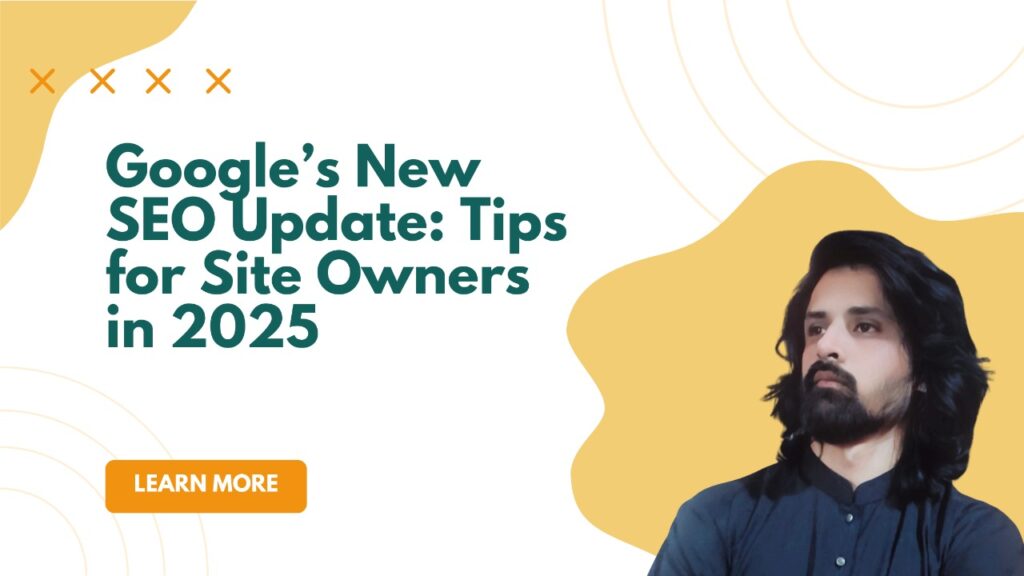Google’s New Update for SEO: Actionable Tips for Site Owners
How Startup Founders Can Adjust SEO for Better Rankings in 2025
Introduction
Running a startup is about speed, adaptability, and smart decisions. But when Google releases another SEO update, your site’s visibility can change overnight. That’s why understanding how to respond to the Google new update for SEO is essential—not optional.
As a startup founder, you’re already juggling marketing, sales, development, and growth. This blog is written specifically for you—with clear, actionable tips to align your website with Google’s latest update for SEO and avoid losing ground in search rankings.
Whether you’re working with an agency or managing SEO in-house, this guide from Optimize With Sanwal helps you confidently adapt, fix, and grow.
Why Google Keeps Updating Its SEO Algorithm
Google’s search algorithm isn’t static. It evolves to:
- Prioritize user-friendly websites
- Reward valuable and original content
- Detect manipulation and spam
- Match search results to user intent more accurately
For startups, these changes can cause a drop in traffic, loss of visibility, or ranking fluctuations—especially if your site isn’t optimized with the latest standards in mind.
The Google new update for SEO focuses heavily on content quality, trust signals, technical performance, and user behavior. Understanding how each area is evaluated allows you to make real, lasting improvements.
What Is Included in the Latest Update for SEO?
Let’s break down what the latest update for SEO brings in 2025 and why these changes matter for startup websites.
1. Helpful Content Signals (Refined)
What Changed:
Google now places more weight on content that offers real value to users, written for people, not just search engines. The update identifies shallow content written solely to rank—and lowers its visibility.
How to Adapt:
- Ensure every page solves a specific problem
- Avoid repeating the same idea across different pages
- Personalize content with use cases, examples, and your own voice
Startup Tip:
Write about how your solution works in real scenarios. For example: “How Our CRM Helped a Small Business Cut Costs by 40%.”
2. Author and Brand Trust Signals
What Changed:
Google now evaluates who created the content and why they should be trusted. Pages without real authorship, business identity, or trust indicators may rank lower.
How to Adapt:
- Add author names, bios, and LinkedIn links
- Display business information clearly (address, contact, team)
- Include customer reviews or use-case highlights
Startup Tip:
Add an “About” section with your story, founder background, or mission. Real people build trust.
3. Technical Performance & Mobile Experience
What Changed:
Google has refined how it measures technical site health and mobile usability. Sites that load slowly, have poor mobile design, or use intrusive layouts can see drops in performance.
How to Adapt:
- Use Google’s PageSpeed Insights and fix slow-loading elements
- Simplify mobile menus and page structure
- Avoid pop ups or ads that cover content
Startup Tip:
Start with your homepage and most-visited landing pages. Speed matters more than design details.
4. Structured Content and Semantic Relevance
What Changed:
Google better understands topic clusters and relationships between pages. Sites that use structured content to guide users through related topics perform better.
How to Adapt:
- Group content under main themes (e.g., “Startup SEO Basics”)
- Link related blog posts and pages internally
- Use headings (H2, H3) to guide readers and bots through topics
Startup Tip:
Create a hub page for a key problem your startup solves, then build out supporting content around it.
5. Spam and Link Quality Enhancements
What Changed:
Google continues to crack down on spam tactics—especially low-quality backlinks and AI-generated content with little human input.
How to Adapt:
- Review your backlinks with a tool like Ahrefs or Search Console
- Disavow harmful links (if any)
- Focus on building relationships, not buying links
Startup Tip:
Write guest posts or do co-marketing with other founders. One quality backlink from a relevant domain beats 50 low-value ones.
How to Evaluate If Your Startup Site Was Affected
Here are signs your site may have been impacted by the latest update for SEO:
- Sudden drop in Google traffic
- Fewer impressions in Search Console
- Pages that used to rank now buried
- Longer load times or technical issues reported
- Increase in bounce rate or lower time-on-site
A Practical How-To SEO Fix Plan for Startup Founders
Let’s look at how you can practically respond to the Google new update for SEO and strengthen your online presence.
1. Start with a Site Audit
Use tools like:
- Google Search Console
- PageSpeed Insights
- Screaming Frog (for crawling errors)
- Ubersuggest or Ahrefs (for backlinks and content issues)
Check for:
- Broken links
- Duplicate content
- Slow-loading pages
- Pages with no traffic
- Pages not indexed
If you prefer expert insight, Optimize With Sanwal offers free SEO audits for startups.
2. Improve Content Depth
Thin or outdated content won’t survive this update.
- Update blogs that are 300–500 words with new data, examples, and FAQs
- Add visuals where helpful (charts, screenshots)
- Use internal links to guide readers to related resources
3. Fix On-Page SEO Elements
Every page should include:
- A clear title with your target keyword
- One H1, several H2s, and short paragraphs
- Alt text on images
- Natural use of keywords (not forced)
4. Optimize for Local and Branded Searches
If your startup serves a specific region:
- Add location-based keywords
- Claim and update your Google Business Profile
- Use consistent business info across directories
If you’re targeting branded traffic:
- Make sure your brand is searchable
- Mention it naturally in blogs and service pages
5. Build Trust Through Content and Structure
- Add testimonials or client success stories
- Write detailed use-case pages
- List your certifications or awards (if any)
- Include contact forms, privacy policy, and a clear value proposition
Why SEO Services Still Matter After Every Google Update
Even if you understand the basics, applying the updates consistently across your startup site takes time and expertise.
That’s why partnering with an SEO-focused team like Optimize With Sanwal helps you:
- Track algorithm changes automatically
- Adjust content, technical, and link-building strategies
- Monitor performance and fix issues quickly
- Create long-term content plans based on your growth goals
We specialize in helping early-stage and scaling startups adapt to changes without wasting time or money.
Book a Strategy Call today and let’s discuss how Our Seo services help you
to improve your site after Google’s latest update.
Want More Help?
If you want to learn more about adapting to the latest SEO changes, check out my YouTube channel. I post regular videos explaining updates, showing real fixes, and walking through SEO audits—step by step.
Final Thoughts
The Google new update for SEO isn’t just about penalizing poor practices—it’s about rewarding good ones. For startups, this means building content that’s useful, a site that loads fast and clearly represents your brand, and a strategy that grows over time.
Start simple. Focus on what your audience is searching for and how your website serves their needs. The rest—rankings, leads, and traffic—will follow naturally.
👉 Ready to take action? Book a Strategy Call with Optimize With Sanwal and let’s fix your SEO for 2025 and beyond.

